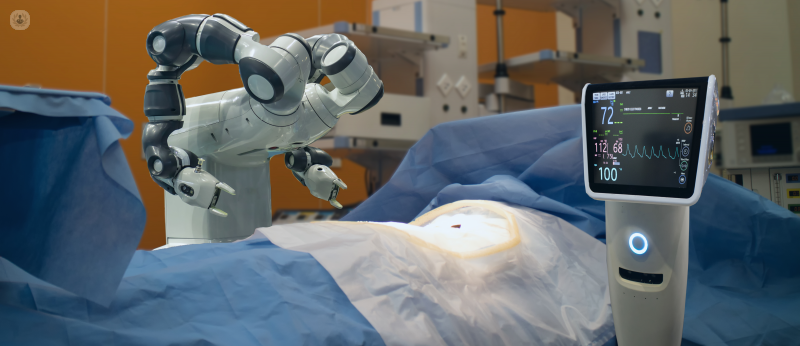Robots and colorectal surgery
Autore:Sometimes people experience worrying changes in their bowels, like a change in bowel movements, diarrhoea or even blood in their stools. They may also feel that they have a huge mass within their tummy and experience unusual cramps and pains. All of these symptoms will require further investigating. Mr Charles Evans, colorectal cancer specialist talks to us about detecting colorectal cancer and the use of robotics in colorectal surgery.

What tests are done to look for colorectal cancer?
Most commonly, a colonoscopy or a sigmoidoscopy will be carried out to look at the bowels or the colon. Sometimes a C.T scan will be carried out and if a worrying lesion is found, further investigation will need to be done. Worrying lesions could be a sign of bowel/colon cancer. All bowel cancers need complete staging, which means a C.T scan will need to be done on your chest, abdomen and pelvis. If the lesion falls within the lower bowel or rectum, you’ll also need an MRI scan of the pelvis.
Once all the images and results have been obtained, a multidisciplinary team meeting will be had, where cancer specialists, bowel surgeon specialists, pathologists and X-ray doctors will come together to discuss the next steps.
A lot of patients at this point will be referred to surgeons for an operation to remove the tumour. Operations are generally done by specialist colorectal surgeons and can be done either as an open operation or as keyhole procedure. The majority of surgeons doing keyhole operations do them as standard laparoscopic operations, however, an increasing number are performing them robotically.
How is robotic surgery carried out?
Robotic surgery in the UK is most commonly performed using the DaVinci device made by Intuitive. There are three parts to this robotic device:
- The surgeon console, from where the surgeon operates. This allows the surgeon to see 3D, high-definition images of the patient’s abdomen, allowing them to operate in an area that is difficult and narrow.
- The patient side cart, where the patient lies, which is attached to robotic instruments that can be controlled from the surgeon’s console.
- The vision stack
What are the benefits of robotic surgery for colorectal cancer?
The obvious benefits of using the DaVinci system include:
- The surgeon can operate with precision. The surgeon uses pincers to move the instruments, so as the surgeon moves his hand the instrument is carefully and precisely moved within the patient's abdomen, again to ensure that everything is done in a controlled manner to avoid any damage.
- The instruments that are used have extra functions that normal laparoscopic ones don't have. Normal laparoscopic instruments open and close without any other range of movement, however, the robotic ones have an articulating wrist. This enables the surgeon to work their way around bends, which is particularly important when you're trying to operate down in the pelvis.
Will all colorectal cancer patients require surgery within the pelvis?
Any patient with rectal cancer will require surgery within the pelvis. The pelvis is a very challenging place to operate because it is a confined space and carries important pelvic nerves and blood vessels. The nerves supply urine and sexual function and the blood vessels drain not only the pelvis but also supply blood to the lower limbs.
Robotic surgery in colorectal cancer has many benefits to the patient and the surgeon. There are the benefits of reducing the risk of converting to an open operation, precise operating, avoiding the risk of damaging nerves and blood vessels. It also offers the greatest chance of removing cancer in a safe way to reduce the risk of recurrence.
If you’ve been diagnosed with colorectal cancer and would like to make an appointment with Mr Charles Evans, visit his Top Doctor’s profile for further details.


